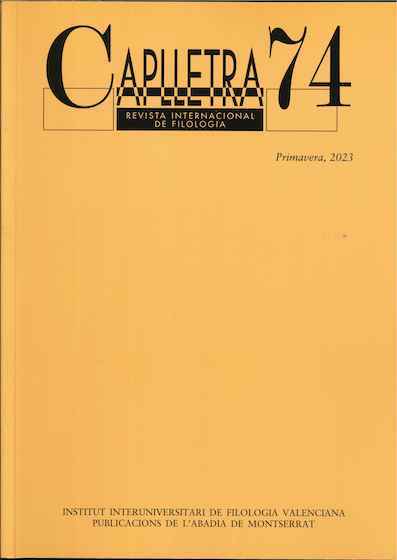The weight of tradition in the verbal classification of Catalan
DOI:
https://doi.org/10.7203/caplletra.74.26036Keywords:
Catalan, conjugation, verbal inflection, verbal augment, verbal irregularity, morphomic patrons, velarized verbs Abstract
Abstract
In Catalan, the existence of submodels of conjugation with augments in all dialects and conjugation classes, along with the limited number of verbs that conjugations ii (batre, témer, poder, dir) and iiia (dormir) have, leads to the conclusion that two proposals are reasonably possible with regard to the organization of verbal classes. Either one admits that all conjugations display regular subconjugations with augments (velar or palatal) (in line with Viaplana’s 1994 seminal work), or one accepts that regular conjugations are limited to the classes that are productive, i.e., conjugation i (cantar) and, far away, conjugation iiib (servir) (in line with Ferrater’s 1970 remarks). In any case, based on frequency and dialectal variation, the maintenance of the models of regular conjugation proposed by the traditional grammar (i: cantar; ii: batre o témer; iiia: dormir, iiib: servir) does not seem operative any more. With these observations in mind, the aim of this paper is twofold: on the one hand, to revise the traditional and dialectological motivations that still sustain the verbal classification and, on the other, to rethink the traditional models of regular conjugation in the light of language teaching efficiency.
 Downloads
Downloads
Downloads
Published
How to Cite
-
Abstract332
-
PDF (Català)591
Issue
Section
License
Authors submitting work to Caplletra for publication must be the legitimate holder of the usage rights. Legitimacy for the purposes of publishing the work must also include images, tables, diagrams and any other materials that may complement the text, whether they are the author of such material or not.
Copyright: on publishing their work in the journal, the author grants Caplletra. Revista Internacional de Filologia usage rights (reproduction, distribution and public communication) for both the paper printed version and for the electronic version.
All work published in Caplletra is covered by the Creative Commons license type Attribution-NonCommercial-NoDerivatives 4.0 (CC BY-NC-ND 4.0).
RESPONSABILITY
Caplletra. Revista Internacional de Filologia does not necessarily identify with the points of view expressed in the papers it publishes.
Caplletra. Revista Internacional de Filologia accepts no responsibility whatsoever for any eventual infringement of intellectual property rights on the part of authors.






